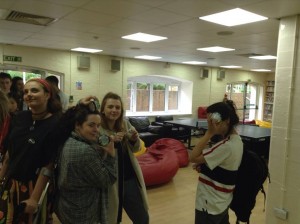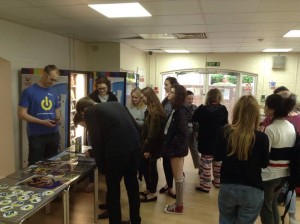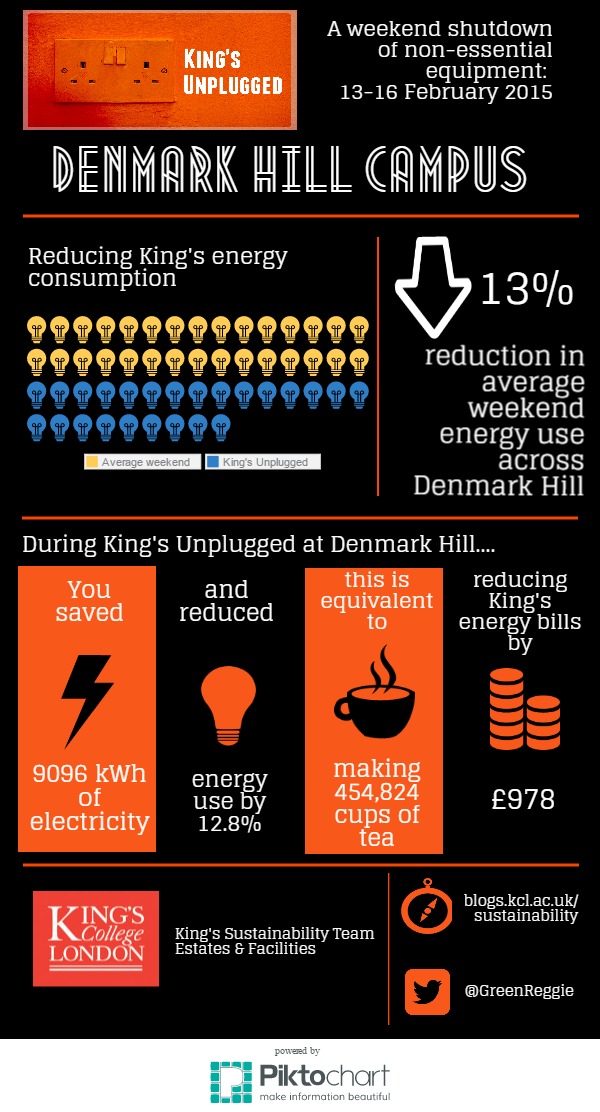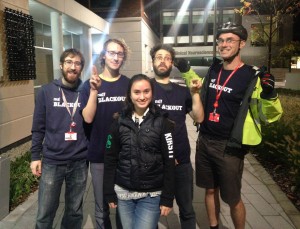[This week’s guest blog comes courtesy of Joanna Peasland, a first-year Geography undergraduate. The views presented do not necessarily reflect those of King’s Sustainability]

2nd October 2014. Copenhagen, Denmark. The IPCC Synthesis Report is released.
The Guardian’s article: “IPCC: rapid carbon emission cuts vital to stop severe impact of climate change” contextualises this latest release of the Panel’s current state of affairs with regards to global environmental change with an unambiguous sense of urgency.
The overriding message is not a new one, but demands to be received with more gravity than it has previously: the effects of climate change are becoming increasingly pervasive, and pose irreversibly dangerous risks unless we reduce carbon emissions to zero and rapidly integrate sustainable energy sources into society. Moreover, the technological and the economic feasibility of switching to alternative sources of energy is now being justified by this united global voice in preparation for much anticipated climate talks in Paris next year.
It goes without saying that release of the most comprehensive report on climate change since 2007 has pushed this environmental issue to the forefront of media coverage. Governments, institutions and populations are divesting in fossil fuels and investing in renewables. This ultimately has one of the two consequences for the future: our planet will descend further toward catastrophic changes or it will benefit from the mitigation of such changes. What follows is a selection of some of the items that have caught my eye during the first semester of the academic year – paved with problems but equal promise. They highlight some of the more ambitious movements towards a revolution in energy policy and a more sustainable future, at a time – seemingly to me – when the debate about global climate change has never been so exhilarating!

Browsing through various newspapers’ online ‘environment’ sub-sections led me to an inspiring read on Denmark’s progression in transforming their energy economy in the New York Times by Justin Gillis; A Tricky Transition From Fossil Fuel: Denmark Aims for 100 Percent Renewable Energy. Gillis discusses the feasibility of the country’s target of eliminating fossil fuels from the energy mix by 2050: a goal which really does set the benchmark for carbon emissions reductions worldwide. This is a country where already, more than 40% of their grid is fed by renewables. These targets however, do not come without their costs. I picked up on one point in particular: Gillis writes of a somewhat imposing ceiling on the Danes’ smooth sailing to sustainable success – the economics of it all. Intermittent wind power makes the country potentially extremely vulnerable, therefore some traditional power plants are favoured as a support system in the event of a blackout that are propped up with various subsidies. These power companies cannot sustain this because their profits will eventually stagnate. International imports of energy bring additional predicaments in the form of the simple ‘ripple effect’ of relying too heavily on outside sources and a potential monopoly game that could play out with increasingly asymmetric power relations. As Gillis suggests, a re-design of the workings of the energy market is required. Perhaps this is as important as the switch to renewables itself. Much like new models of manufactured goods, its accessories, its ‘supporting infrastructure’, must adapt and progress also in order to harmonise with changes of the product itself.
It would be foolish not to mention the agreement pledged by Mr Obama and Chinese President Xi Jinping, aiming to reduce carbon emissions below 1990 levels back in November. A deal well received by a wider community; US climate negotiators (apparently) received great applause for it during the climate talks at Lima in early December. Tim McDonnell’s piece for Climate Desk – Obama’s Deal With China Is a Big Win for Solar, Nuclear and Clean Coal – offers a useful appraisal. China is now compelled to firmly hold its place as the world’s frontrunner of the renewable energy sector, through a requirement to source an amount of energy equivalent to the entire electricity grid of the States, entirely from renewables by 2030, as it now has commercial backing from the US. Coupled with caps on emissions and further cuts in the US, this progression will clearly be mutually beneficial for both countries and for the greater good of the environment.

An implication of the new deal is undeniably the eventual rise of cost for the US as a net energy importer as the stock prices of solar power will escalate as it is integrated into China (exactly when and how much by is largely undefined as of yet). But, to grossly oversimplify the situation, the US has now publicised its seemingly increased support for China’s technological advancements, thus the optimist in me is hopeful for the future energy relations between the two powerhouses. With massive carbon capture and sequestration and nuclear plans also on the agenda, McDonnell writes of the hoped geopolitical ease of this deal relative to global scale, legalistic treaties.
Of course, there is internal contention brewing within Congress. Appropriately dubbed ‘climate deniers’, Republicans have reacted badly as their bone of contention claiming that China is unwilling to take steps to cutting emissions has all but been demolished in the wake of news of the talks. The Guardian writes of the backlash such as threats to implement continual legislative walls to Obama’s green promises by the likes of Republican speaker of the House John Boehner. There is certainly no easy route to changing the national behaviour and organisation of the US energy system, to put it lightly.
As I write, the year (2014) is drawing to a close yet anticipation for change is hanging high. News of daily developments flood my social media timelines as leaders in governance from all corners of the globe have spent two weeks negotiating climate at the UN 20th Conference of the Parties in Lima, Peru. The Green Climate Fund has reached its first milestone with vast contributions from both some of the most advanced and emerging economies alike. Even Australian leader, Tony Abbot, pledged 200 million dollars (AUS). The fund is a “start” to addressing the problematic relationship between developing nations and exploitation of fossil fuels, writes The Climate Reality Project activism blog. My question is how exactly it will be distributed and who will be the most favoured recipients of this fortune?
Does the hype surrounding such global efforts cloud worrying developments that directly combat sustainable initiatives? In the UK, George Osborne’s autumn statement favoured advancing the dreaded Shale Gas industry, granting 31 million pounds of taxpayers’ money for research drilling and an additional few million on “public engagement” writes Damien Carrington for The Guardian. Burying our heads in the sand, for better use of a cliché, and pursuing ‘less conventional’ fossil fuel route is neither clever nor safe – on many levels.

An issue this pervasive is bound to leave me ignorant to the great complexities of the political and economic implications of these crucially needed sustainable initiatives. Rush the transition to renewables and entire industries come crashing down, not to mention the jobs within them, yet must we accept that sacrifice to some degree may be inevitable however we approach it? Problems are likely to greet us at every corner. However, these simple but beautifully witty and fiercely blunt words of Dr. Guy McPherson stay with me and reaffirm my attitude: “if you really think the economy is more important than the environment, trying counting your money while holding your breath”. The pragmatism being, of course, that climate change could not be more inconvenient to the economy. But it is this very inconvenience that makes it most certainly in our long-term interests to transform our energy habits. And transform we must.
– Joanna Peasland (joanna.peasland@hotmail.co.uk)
Photograph: Danny Lawson/PA, United States Government, Hakan Dalhstrom, UNISDR Gallery








 each year for an award promoting an environment of commitment to sustainability.
each year for an award promoting an environment of commitment to sustainability. Fume Cupboard Management Policy
Fume Cupboard Management Policy among other institutions such as UCL who have been very successful with the system
among other institutions such as UCL who have been very successful with the system itself from the fossil fuel industries. For those who have not followed the progress of the campaign, it really kicked off in October with the submission of a 1200 signature petition to the university administration. While that number has since increased to over 1400, the university finally declined the divestment option formally in mid-February. However, much to King’s credit, the Principal’s Debate went ahead as scheduled, and it made for a most lively and engaging evening, and further demonstrated the scope of the passionate support for divestment at King’s.
itself from the fossil fuel industries. For those who have not followed the progress of the campaign, it really kicked off in October with the submission of a 1200 signature petition to the university administration. While that number has since increased to over 1400, the university finally declined the divestment option formally in mid-February. However, much to King’s credit, the Principal’s Debate went ahead as scheduled, and it made for a most lively and engaging evening, and further demonstrated the scope of the passionate support for divestment at King’s. known carbon reserves will be left in the ground. Given that fossil fuel companies are valued largely on the reserves they hold, these so-called ‘stranded assets’ would rapidly sink such companies and lead to a crisis similar to that when the US housing bubble burst in 2008, only far worse. That bubble was worth a staggering $2.8 trillion. The value of the carbon bubble? An unfathomable $28 trillion. Campanale explained carefully the financial folly in continuing to invest in companies whose future projects are all but guaranteed to lose money, providing a sound financial case for divestment.
known carbon reserves will be left in the ground. Given that fossil fuel companies are valued largely on the reserves they hold, these so-called ‘stranded assets’ would rapidly sink such companies and lead to a crisis similar to that when the US housing bubble burst in 2008, only far worse. That bubble was worth a staggering $2.8 trillion. The value of the carbon bubble? An unfathomable $28 trillion. Campanale explained carefully the financial folly in continuing to invest in companies whose future projects are all but guaranteed to lose money, providing a sound financial case for divestment.









